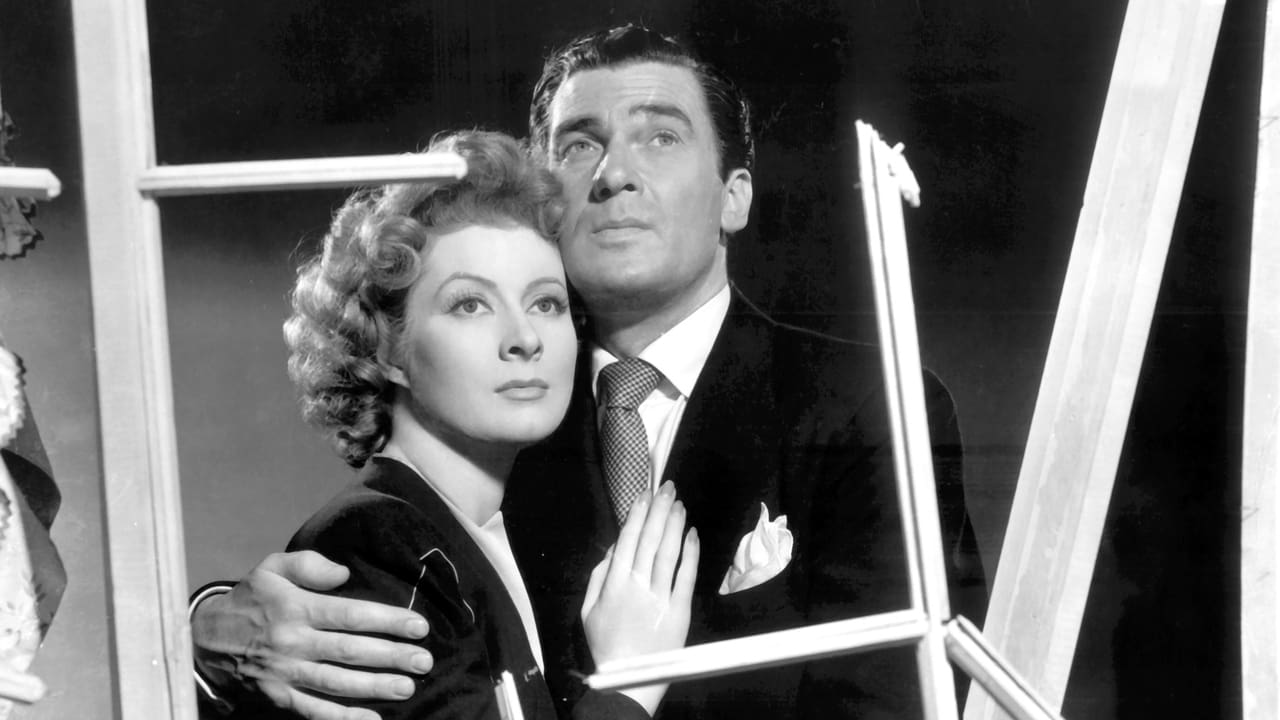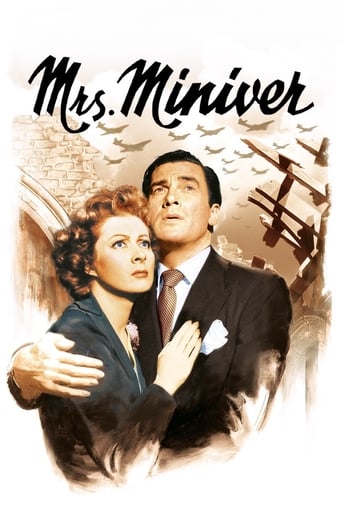

The plot isn't so bad, but the pace of storytelling is too slow which makes people bored. Certain moments are so obvious and unnecessary for the main plot. I would've fast-forwarded those moments if it was an online streaming. The ending looks like implying a sequel, not sure if this movie will get one
... View MoreExcellent and certainly provocative... If nothing else, the film is a real conversation starter.
... View MoreI enjoyed watching this film and would recommend other to give it a try , (as I am) but this movie, although enjoyable to watch due to the better than average acting fails to add anything new to its storyline that is all too familiar to these types of movies.
... View MoreIt is interesting even when nothing much happens, which is for most of its 3-hour running time. Read full review
... View MoreEven if I was involved in the World War II on the side against the UK I would still love this film. Everything about it is uplifting and certainly helped people of the UK feel better after watching it. Especially because it was released in the 1942 when war was certainly not won yet.Everything about this film is excellent, acting, plot, cinematography. Simply it is just a fantastic piece of propaganda! If you are a student of film making this is a must see for you, but if you are feeling like spending a rainy afternoon with a cup of an English tea in your hand, then you should watch this film. It will make your afternoon worthwhile.
... View MoreI'd give this turkey zero stars if I could, but a "1" will have to do. All the glowing reviews must be jokes. This vapid, poorly -acted propaganda film is so bad it's hilarious. Winner of 6 Academy Awards, you say? Nonsense. Those Awards weren't won - they were paid for fair and square. Garson's acting is zombie-like and the rest of the characters are equally dull: Her husband is a buffoon, her pilot son a swish, her younger son an irritating brat and her daughter unremarkable. Think the son is gong to buy it? Wrong! The brand-spanking new daughter-in- law does and her death scene is so predictable yet trite it made my eyes ache. And the church scene at the end - so much stiff upper lipiness it made me want to turn the thing off and brew some tea.
... View More"Mrs. Miniver" is an insightful slice of upper-class life in small British towns. And Oscar-winning Greer Garson was born to play that role. She illuminates the screen with her delicate traits and her naturalness covering a wide range of attitudes (rather than emotions) from gravity and dignity to sympathy and some bits of extravagance. Of course, every now and then, Walter Pidgeon steals the show as the loving and caring husband, but the focus is clearly on the titular heroine.And speaking of heroine, it seems like within its documentary value, William Wyler also tries to highlight the everyday heroism of women like Kay Miniver before the word would take its fullest meaning when War would be declared to Germany. Yes, it takes some moral strength, some guts, to raise a family, to make a man like Vin (Richard Ney) out of a boy, to make his involvement to defend his country going without saying, to take care of a house, man, children during a time where women were not -like feminists love to point out- slaves of men, but like the trustworthy sentinels of the family sanctuary, no less sacred than the city, whose defense relied on men's shoulders.Men outside and women inside, this was not a denigration of women's rights but an equilibrium that every civilization had reached in a long natural process whose ultimate goal was to ensure harmony on a longer term. A film like William Wyler's "Mrs Miniver" is the perfect answer to feminism because it demonstrates the positive role played by women in the early 20th century, they weren't devoted to men, but to an order that valued men and women as well, in different yet complementary ways. And now that characters like Ellen Ripley, Sarah Connor, Lara Croft or the Bride became fashion, there is something refreshing in the more traditional form of courage and strength embodied by Garson. In her own personal way, she kicks ass.Of course, I'm not ignoring the film's political motives. I concede a similar film could have been made with a "Frau Muller" mother a happy German family, but "Mrs Miniver" is immune against such accusations because the film clearly was made at a time where Germany had the upper hand (maybe even released before America's involvement) therefore, Britain was the hunted, the wounded one, and it's legitimate to show British people victims of a war they didn't start, well, not the civilians anyway. Later, a film would show Germany destroyed by the bombings, "Germany: Year Zero" but it was in 1947, "Miniver" is from 1942, these five years, let's just say an eternity, war wasn't over yet and Germany still could win, "God defend the 'right'" was still a prayer, and the year of the film's release makes the atmosphere of the final act even more unsettling.And the film evokes the War's infamous 'innovation', as the vicar says at the end in the memorable speech: "it's people's war", homes became battlefields. It's very revealing of the war's barbarity that the three victims of the final bombing were a child, an old man and a young lady. Fighting became such a natural choice, the word 'hero' I mentioned lost its meaning. For us, these people are worthy of admiration, but for them, they were just doing their duty. Men were assigned to escort some ships and could not 'sail back'. Being a father myself, I hope I'll never have to cover the ears of my daughter, and pretend nothing will happen while hearing a strident whizzing getting louder. The merit of "Mrs Miniver" is to show the war from the distant perspective of civilians, working like warning for future generations. No one who lived a war can wish for one to happen, and no wonder we have so many warmongers in our politicians' baby-boom generation.Still, "Mrs Miniver" could've been just a war picture, with an emphasis on 'picture', a story, with events working like plot devices. A brave wagon master played by Henry Travers wants to enter his beautiful rose named after Mrs. Miniver, in a contest that only Lady Beldon (a great Dame May Witty) ever participated in and won ... we know the old coot will have a change of mind (or heart, in that specific case). When Carol, her grand-daughter, played by the beautiful Teresa Wright comes to ask Miniver to convince the man to withdraw his rose, her son Vin accuses her of snobbery ... naturally, they fall in love right after. Men talk about a disappearing German pilot, and bingo, guess who finds him. It's like every chain of events works in the most predictable way, and this is why, as soon as good old Vin joined the RAF... he made his death the most predictable one.The omen starts with his parents' concerns, the last-minute calls of duty, the reluctance of Lady Beldon to have her Carol lose her husband at war like she did at a younger age, and naturally, Carol herself, who shares her fears with her mother-in-law, and explains that she wants to make the most of life before turning into a widow. And God, I didn't see it coming ... the story's masterstroke. I don't know if it can be labeled as a twist ending, but it had for me the same shocking effect. It's an irony of fate or maybe God's response to men's presumptuousness. Tragedy struck down the Miniver family by killing off Carol, and as sad as it was, this was the highlight of the film for me, I was blown away by that ending, because all the inspirational and emotional stuff that rhymed in conventional was immediately redeemed by Carol's death, one that was true to life's unexpectedness.Sorry to conclude with movie-geek jargon, but enough of grandiloquent words, "Mrs. Miniver" features perhaps one of the most underrated (and powerful) twist-endings, and this is why I went from liking to loving it.
... View MoreThere's nothing like a suburban British housewife to aid her family in getting through the war. In the case of the upper middle class Miniver family, it is the wife (Greer Garson) who keeps the home fires burning, literally, as she fends off Nazi fliers, keeps her children calm in an air raid, and helps the family mend through a tragedy concerning her oldest son (Richard Ney) and the young woman he loves (Teresa Wright). She is also beloved in her village of Belden, given the distinct honor of having a beautiful red rose named after her by the town's long-time railroad station master (Henry Travers), daring to enter it in a contest opposite the town's delightfully imperious matriarch (Dame May Witty), Wright's grandmother. This leads to the famous town flower show sequence, a plot element so remembered by fans that years later it was incorporated into "Downton Abbey" involving Dame Maggie Smith's character.Of course, there's more to this film than a flower show, the guilt over buying a new hat during troubled financial times (while husband Walter Pidgeon buys a new car on the very same day with the same trepidation of telling his wife) and young love. It's about England's transition from innocence to potential annihilation as the evil Nazi Germany bombs the town (at least they waited until the winner of the Belden cup was announced), and how peace loving communities will not allow tyrants to attempt to destroy their freedom. Everybody in this peaceful village gets involved, from store owner turned air raid warden Reginald Owen, parson Henry Wilcoxin and even the Miniver's servants. A screenplay filled with light sentiment, sweet romance, subtle comedy and a divine spirituality of good vs. evil makes this truly a perfect film with everybody excellently cast and the pacing perfectly fitting to each mood that the film undertakes.It's been tempting over the years to make fun of this film which has been spoofed ("Laugh-In", parodying the Nazi soldier with Arte Johnson approaching guest-star Garson) and given legend for Garson's alleged lengthy Oscar speech. It should be noted that 1943's Oscar Winning Best Film "Casablanca" had a New York release during the same year as "Mrs. Miniver", which makes a close call for which of the two would have won the Oscar had "Casablanca" had its Los Angeles release just a few months earlier. On its own, "Mrs. Miniver" still stands the test of time today, and that is also due to its brilliant screenplay and tight direction by the legendary William Wyler.
... View More